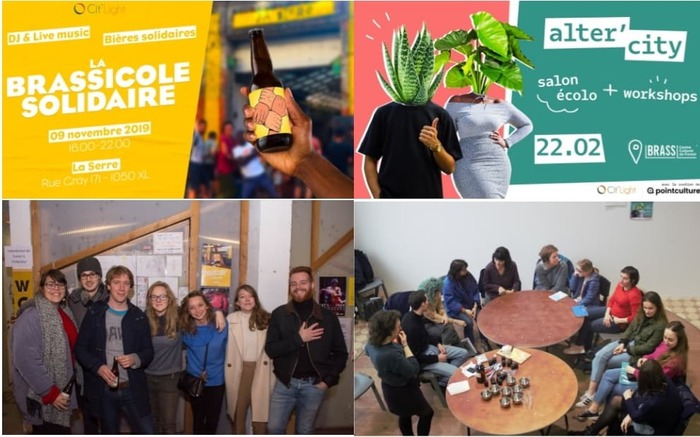Changing climates and Climate Change
Écrit le 25 Avril 2019
Environnement DémocratieIf you are anything like me, the political activism of your high school years was either non-existent or, in essence, largely symbolic and not very effective. It will have been with no small sense of shame, then, that you watched a determined group of Belgian schoolchildren go on strike to protest the lack of action in confronting the biggest challenge of multiple generations: climate change. Truth flows from the mouths of babes, as the scripture tells us, and in this case there is no ambiguity. A radical shift is needed, now, immediately, if we are to avoid catastrophe. In this article, we examine how there are a number of different movements within Brussels which look to bypass traditional political channels and provide solutions to the issues.

The archetypal political response to climate change has been…lacking, to be polite. To be accurate, it has been woefully, pathetically, criminally inadequate. The level of myopia has been almost literally breathtaking, akin to a room of people fighting over a fistful of dollars on the floor whilst gold bars await them outside, if only they could cooperate on opening a window. Even the risible gains made are subject to change, fragile and transient, semi-permanent sacrifices on the altar of public expediency. It is this phrase – public expediency – which is the crux of the matter. It is simply not considered electorally viable for a political party to devote itself solely to the most important issue facing humanity. It has become an article of political faith, as inviolable as gravity, as inexorable as climate change itself. Yes, people care – but they do not care ’enough’. What this shows, however, is not a callous disregard of the future from the electorate, nor an inability to understand that problems are accruing over the horizon. It appears to be little more than an assumption on the part of the part of the political class.
However, this common truth is being challenged in a number of remarkable ways, all across the city of Brussels (and across Europe itself). Quite apart from the ongoing protests regarding the climate, another example of a way in which many of these disparate strands can be seen intertwined has been blossoming all over Brussels in recent months. The advent of the mobile, app-accessible scooter has been as ubiquitous as it has fast. It encapsulates the harnessing of technology to provide a relatively clean and efficient public transport system which in turn provides jobs in maintenance, construction, customer service, retail, and second-line industries such as updated infrastructure and improved connectivity (to ensure coverage at all times). These jobs can be provided or, at the very least, underwritten by the state, which provides a boon to whichever party is bold enough to lay claim to them. There are also further opportunities to be explored in terms of education, with regard to road safety, mechanics, town planning, and so on. The plethora of different brands competing for a very similar niche in the market suggests no shortage of commercial enthusiasm, as well. Yet it is not just in entirely new industries that new solutions can be applied. There has long been an argument for financing free public transport within Brussels, paid for by removing the subsidy on company cars; likewise, developing new anti-theft technologies ought to enable a more proactive run at cost-free public cycling within the city.
It would seem, therefore, that there is a multi-faceted movement taking place in Brussels which is focused on (or at least born of) the need to address the problem of climate change. Firstly, the image of 35,000 Belgian schoolchildren skipping class to protest against a lack of action is an extremely powerful one. It ties in to compelling narratives about the shape of the world we wish to bequeath to the next generation, and speaks to a sometimes dormant sense of shame that such measures are taken on the initiative of the very young, rather than those in positions of influence; however, the growth of groups such as Extinction Rebellion Belgium suggests that copycat demonstrations are beginning. Secondly, the meteoric rise of the individualised, instant-access transport system is one which has profound consequences for the future of travel within cities. This has, in turn, pushed the existing authorities to think of new ways to maintain their relevance in a rapidly changing world – as the debates around the future of public transport highlighted in the previous paragraph have shown. It is also worth noting the strategies which have been employed elsewhere in the world – such as in the United States – have sought to distance themselves from the traditional models of political parties being the source of change, and have instead examined new legal ways of bring about different policies and methods of combatting climate change.
What alternatives that may be found to our current system is a matter for the imagination; what will happen if they are not found, is not. It is up to us, now, to fulfil the promise of our younger selves and grant those children who marched an even chance to live up to their own, very promising beginnings.
Commentaires
comments powered by DisqusArticles qui pourraient vous intéresser

Un cadeau solidaire : offrir des parts de coopératives à ses proches
CoopérativeLes fêtes de fin d’année approchent. Plutôt que d’offrir les traditionnelles chaussettes et autres ustensiles de cuisine intelligents qui finiront ostensiblement planqués dans une triste armoire jamais ouverte, n’existe-t-il pas une alternative tout aussi festive de cadeaux de cœurs qui soient à la fois éthiques et solidaires ? Nous vous proposons alors d’offrir des parts de coopératives, en reprenant un ensemble de coopératives belges qui œuvrent dans l’environnement, la technologie, la mobilité, et la finance.

Zoom sur Konligo : de la recherche universitaire à l'économie circulaire
Zoom sur Financement ÉconomieEn début de seconde vague COVID-19, Cit’Light a interviewé Aushim Koumar, fondateur de Konligo, une startup bruxelloise spécialisée dans des structures dépliables pour l’organisation d’événement. Projet entrepreneurial démarré en 2018, résultant de recherches universitaires, Konligo s’inscrit dans une démarche d’économie circulaire. Cit’Light s’est donc intéressé à leur processus de création d’entreprise en sortant de l’université, ainsi qu’à leur moyen de financement.

Un crédit pour les pauvres
Économie CréditL’idée est largement répandue que les pauvres sont de piètres consommateurs. Sans le sou, ils n’achètent rien. L’équation est simple : la vie les a condamnés à la pauvreté et personne ne peut rien pour eux. En 2006, l’invention du « crédit pour les pauvres », a été décorée d’un prix Nobel de la paix. Aujourd’hui, le système de micro-crédit s’est répandu dans plus d’une quarantaine de pays sous diverses formes, avec toujours cette volonté de venir en aide aux personnes les plus démunies. Mais quant est-il derrière cette apparente innovation ?
Tags
À la une

Innovage, le festival intergénérationnel du bien vieillir
ÉvénementLe 30 septembre 2023 aura lieu la seconde édition du festival intergénérationnel du Bien Vieillir, Innovage.

Pour un stoïcisme militant (Imagine)
Article de presseChaque semaine, notre équipe rédaction sélectionne et relaye un article de presse en lien avec les thématiques abordées par Cit’Light. Cette semaine, nous relayons une chronique publié dans le magazine de slow press « Imagine, demain le monde » intitulée « Pour un stoïcisme militant ».

Nous rejoindre
EngagementCit’Light est un transmédia qui vise à communiquer par rapport à l’ensemble d’outils et d’alternatives qui peuvent nous permettre à nous, citoyens, de se réapproprier notre environnement. Au travers d’analyses de fond et d’un tour des initiatives existantes à l’étranger et en Belgique, il devient possible pour tout un chacun de participer clés en main à la construction de la société de demain. Venez nous rejoindre !
